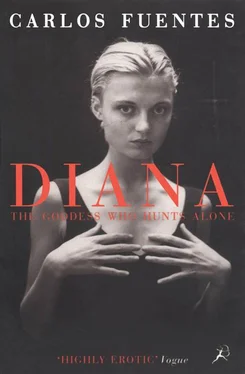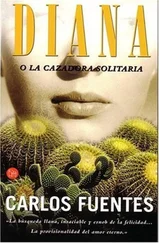Carlos Fuentes - Diana the Goddess Who Hunts Alone
Здесь есть возможность читать онлайн «Carlos Fuentes - Diana the Goddess Who Hunts Alone» весь текст электронной книги совершенно бесплатно (целиком полную версию без сокращений). В некоторых случаях можно слушать аудио, скачать через торрент в формате fb2 и присутствует краткое содержание. Год выпуска: 2012, Издательство: Bloomsbury UK, Жанр: Современная проза, на английском языке. Описание произведения, (предисловие) а так же отзывы посетителей доступны на портале библиотеки ЛибКат.
- Название:Diana the Goddess Who Hunts Alone
- Автор:
- Издательство:Bloomsbury UK
- Жанр:
- Год:2012
- ISBN:нет данных
- Рейтинг книги:3 / 5. Голосов: 1
-
Избранное:Добавить в избранное
- Отзывы:
-
Ваша оценка:
- 60
- 1
- 2
- 3
- 4
- 5
Diana the Goddess Who Hunts Alone: краткое содержание, описание и аннотация
Предлагаем к чтению аннотацию, описание, краткое содержание или предисловие (зависит от того, что написал сам автор книги «Diana the Goddess Who Hunts Alone»). Если вы не нашли необходимую информацию о книге — напишите в комментариях, мы постараемся отыскать её.
Diana the Goddess Who Hunts Alone — читать онлайн бесплатно полную книгу (весь текст) целиком
Ниже представлен текст книги, разбитый по страницам. Система сохранения места последней прочитанной страницы, позволяет с удобством читать онлайн бесплатно книгу «Diana the Goddess Who Hunts Alone», без необходимости каждый раз заново искать на чём Вы остановились. Поставьте закладку, и сможете в любой момент перейти на страницу, на которой закончили чтение.
Интервал:
Закладка:
“I like it I like it I like it …”
When we finished, she turned toward me, half closed her gray (blue?) eyes that were like a forgotten mist, and said, “You have no imagination.”
XVI
Reasonably or not, I’ve lived to write. Literature, almost since I was a child, has been the filter of experience for me, from fear of being punished by my father to my most recent night of love. Sex, politics, soul — it all passes through my literary experience. The expectations of the book refine and strengthen the facts of lived life. Perhaps nothing of this is true, or perhaps in reality it’s the other way around: it’s literary imagination that determines, provokes the “real” situations in my life.
But if that’s the way it is, I’m not aware of it. Yes, I would like to be aware that for me reality is not a simple fact or that it’s defined by only one of its dimensions. There are people for whom reality is only the objective, concrete world — the chair is the chair, the mountain has always been there, the cloud passes over but obeys the laws of physics — all that is real. For other people, the only reality is internal, subjective reality. The mind is a vast unfurnished room that slowly but surely fills us up as we live with the furniture of perceptions. The objective world exists, but it has no meaning unless it passes through the sieve of my mind. Subjectivity gives reality to a world of mute, inanimate objects.
But there is a third dimension, which is where my individuality comes into contact with others, with my society, my culture. That is, something exists that is neither paradox nor impossibility, something called collective individuality. Within it, I feel myself to be most complete, in greatest consonance with the world. It’s in that shared individuality where I find family, women and sex, friends … So reality for me is a three-pointed star: matter, psyche, and culture. Material reality, subjective reality, and the reality of the contact between my ego and the world. I don’t like sacrificing any of them. Only when the three are present can I say I’m happy.
Our evening parlor games continued and one of them was Scrabble. Now, the alphabetic combinations change according to which language you play in: Spanish abounds in vowels, while English is rich in consonants. The English w , the sh, the double tt, mm, or ss make for inconceivable conjunctions in Spanish. On the other hand, we do have that clitoris of language, the ñ, which drives foreigners insane because they think of it as a Hispanic, medieval extravagance comparable to the Holy Inquisition, when it’s actually a futurist letter that embraces and suppresses the laborious gn of French, the nh of Portuguese, and the unpronounceable English ny.
The three of us — Diana, Lew, and I — played like a bored, well-established family, using an English alphabet. While I know English well, it isn’t mine nor I its. I’ve never dreamed in English. I speak it, but I’m mentally translating very fast from Spanish. It’s easy to see because my English abounds in Spanish cognates, in locutions derived from Latin or Arabic rather than Saxon or German. My error that night came when I had before my eyes the word wheel, perfectly formed, and with six spaces after it that I could fill in to pick up some great points. All that I could think of was wheelbarrow, because sometimes I’d hum a pretty Irish song about “Sweet Molly Malone,” who “wheeled her wheelbarrow through streets long and narrow,” but though barrow was six letters, I didn’t have the right ones. I had to pass, and Lew filled the space I coveted with his six letters, wright —the old Saxon word wheelwright. I said I didn’t know that word. Diana gave me a mocking look. Then she brusquely turned my letters around and showed that I could have filled at least five of the spaces with chair and gotten wheelchair.
“So you think you’re going to teach in a university in the U.S.?” she asked, her tone unbearably sarcastic. “Be careful. The students might end up teaching you.”
“Do they know everything, or do they only think they know everything?”
“They know more than you, you can be sure of that,” said Diana. Lew lowered his eyes and asked if we could go on playing.
But it was Lew Cooper who suggested another game for our nights of Durango tedium. Let’s imagine, he said, that we’re Rip Van Winkle and we’ve been asleep for twenty years. When we wake up, what kind of country will we find?
“Mexico or the United States?” I asked, to make it clear there was more than one country in the world.
They stared at me as if I were a complete idiot.
Cooper immediately launched into the inevitable theme of the loss of innocence, which so obsesses the gringos. I always wondered, When were they innocent: when they were killing Indians, when they took up manifest destiny and unleashed their continental ambitions from coast to coast, when? In Mexico, we cherish the memory of the cadets who threw themselves off the walls of Chapultepec Castle rather than surrender to the invading forces of General Winfield Scott. Were they just perverse adolescents who refused to hand their banners over to invading innocence? When was the United States ever innocent? When it exploited enslaved black labor, when its citizens massacred one another during the Civil War, when it exploited the labor of children and immigrants and amassed colossal fortunes acquired, no doubt, in an innocent way? When it trampled defenseless nations like Nicaragua, Honduras, and Guatemala? When it dropped the bomb on Hiroshima? When McCarthy and his committees destroyed lives and careers through mere insinuation, suspicion, and paranoia? When it defoliated the jungles of Indochina with poison?
I laughed to myself, holding back my possible answer to the question of the Rip Van Winkle game. Yes, perhaps the U.S. was only really innocent in Vietnam, for the first and last time, thinking it could, as General Curtis LeMay, head of the U.S. Air Force, said, “bomb Vietnam back to the Stone Age.” How shocking it must have been for the country that had never lost a war to be losing one to a poor Asiatic, yellow people, a people ethnically inferior in the racist mind that, flagrant or suppressed, ashamed or defiant, every gringo has nailed to his forehead like a cross.
The two Yankees went on talking, and perhaps because both were actors, I imagined that the famous innocence was only an image of self-consolation especially promoted by movies. In literature, from the beginning, from Hawthorne’s tortured Puritanism, Poe’s nocturnal nightmares, and James’s daytime ones, there has been no innocence, just fear of the dark power each human being carries within himself. The enemy self, not a whale, is the protagonist of Moby-Dick, for instance. That’s almost a definition of good literature, the epic of the enemy self …
I don’t know if Tom Sawyer and Huck Finn are true innocents or if it’s just a fine bucolic desire for contact with family (Tom) or the river (Huck) that distracts them momentarily from the obligation to make money, subjugate inferiors, and practice arrogance as a divine right. In any case, Mark Twain wasn’t innocent; he was ironic, and irony is negative, according to its modern inventor, Kierkegaard, “an abnormal development which … like the liver in Strasbourg geese finally kills the individual.” But at the same time it is a way of reaching the truth because it limits, defines, makes finite, abrogates, and castigates whatever we think true.
In American movies, the myth of innocence is created with no irony whatsoever. My childhood eyes were filled with figures from the countryside, from small towns, who come to big cities and are exposed to the worst dangers. They fight against sex (Lillian Gish), locomotives (Buster Keaton), and skyscrapers (Harold Lloyd). How I enjoyed, when I was a kid, the sentimentally innocent movies of Frank Capra, where the valiant small-town Quixote, Mr. Deeds or Mr. Smith, defeats with his innocence the powers of corruption and falsehood.
Читать дальшеИнтервал:
Закладка:
Похожие книги на «Diana the Goddess Who Hunts Alone»
Представляем Вашему вниманию похожие книги на «Diana the Goddess Who Hunts Alone» списком для выбора. Мы отобрали схожую по названию и смыслу литературу в надежде предоставить читателям больше вариантов отыскать новые, интересные, ещё непрочитанные произведения.
Обсуждение, отзывы о книге «Diana the Goddess Who Hunts Alone» и просто собственные мнения читателей. Оставьте ваши комментарии, напишите, что Вы думаете о произведении, его смысле или главных героях. Укажите что конкретно понравилось, а что нет, и почему Вы так считаете.












